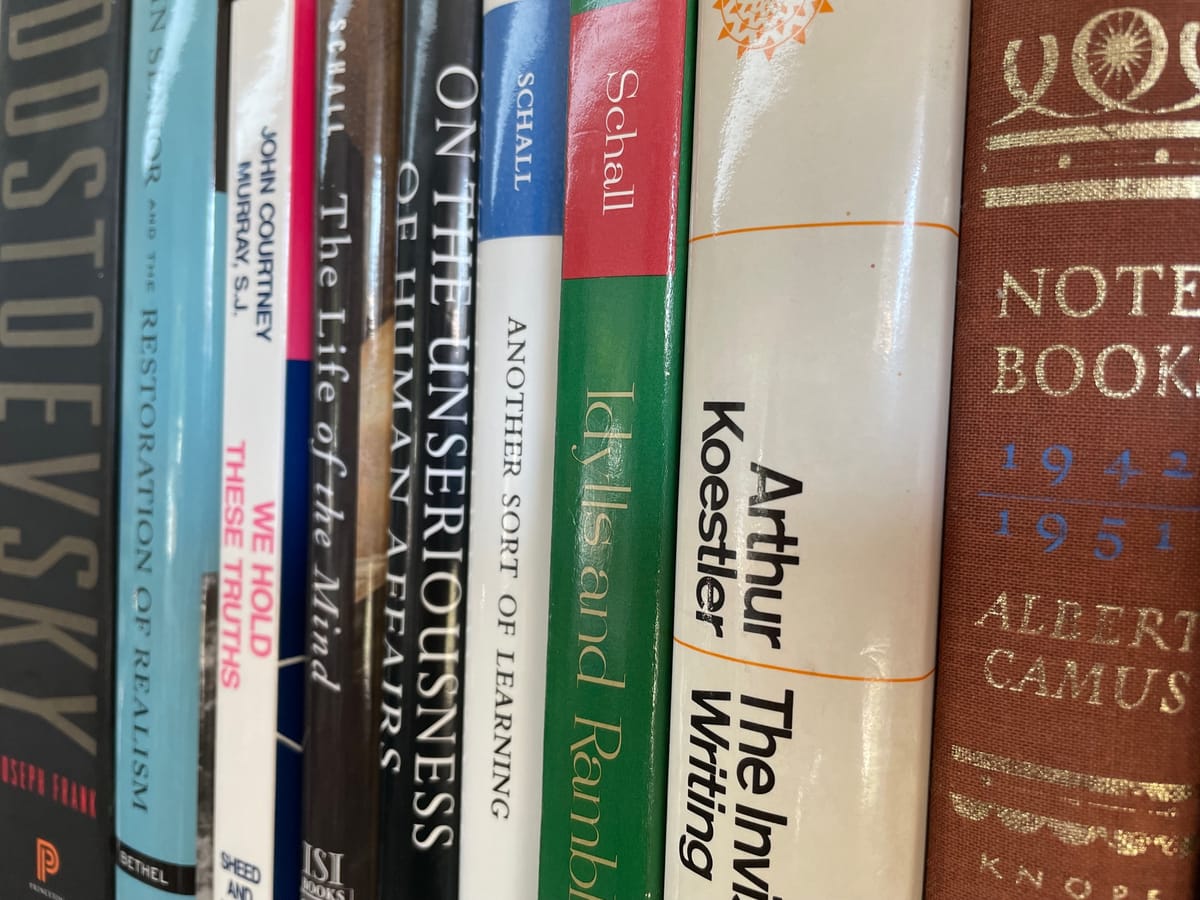James Schall's Another Sort of Learning

Summer 1988. I’d just graduated from the University of Michigan and was preparing to enter the University of Notre Dame School of Law. I was working second shift at a local factory as a material handler (gopher). I was working six nights a week, Monday through Saturday,4:30 p.m. to 12:30 a.m.
As anyone can tell you who has worked second shift, it makes for a strange existence. For a young man living with his parents and with no responsibilities, it meant oceans of time: the prime beer-drinking time is over when you get off work, and all your friends are working while you have time to play.
So I used the time to indulge my reading.
Biographer Michael Coren once wrote that some people in their early twenties acquire an "inquiring intensity." They catch a curiosity bug and find themselves wanting to know about everything. That describes me at age twenty. Although I’d always read a fair amount, I suddenly had an appetite to read everything. Already a student with large weekly reading assignments—I majored in history with a minor in literature—I used my free time during my junior and senior years at college to teach myself a semester of Latin, read modern classics like The Catcher in the Rye and All Quiet on the Western Front, and peruse economics, history, and biography.
The reading was fervid, but I can’t say it was productive. It was broad with no direction. Reading a lot, but not really knowing what I was absorbing, with no context or frame of reference with which to analyze the reading.
During one of those summer afternoons, I was sitting in my parents’ family room, doing nothing, just rocking in a chair and looking around. A book on the bookshelf caught my attention. I pulled it down and looked at it.
It was still wrapped in plastic: Another Sort of Learning. It was written by a man named James V. Schall and published by a company called “Ignatius Press.” A Lutheran with no taste for things Catholic, I didn’t know "Ignatius" signaled a Catholic thing. I also didn’t know James Schall was a Jesuit priest.
The book’s cartoon-print cover intrigued me. The sub-title fascinated me: Selected Contrary Essays on How Finally to Acquire an Education While Still in College or Anywhere Else: How to Employ Your Leisure Time When Ultimate Questions Remain Perplexing in Spite of Your Highest Earned Academic Degree, Together with Sundry Book Lists Nowhere Else in Captivity to Be Found.
I was, maybe literally, salivating, but I didn't want to unwrap it, just in case my Dad hadn't meant to order it and planned on sending it back for a refund. As soon as he got home, I asked him about the book. He looked at it and shrugged. He didn’t know where he got it, he said, but I could have it.
I read it immediately. I liked the essays, but liked more the list of suggested books in the back of each chapter. I’d heard of some of the authors before: Plato, Cicero, G.K. Chesterton, C.S. Lewis, J.R.R. Tolkien. Most I hadn’t: Etienne Gilson, Christopher Dawson, Josef Pieper, Hilaire Belloc, many others.
With Schall’s book, my aimless reading ceased. I now had some direction.
To this day, I don’t know how that book got in my father’s house. I sometimes fancy that it was Providence. An Ignatius Press book by a Jesuit priest among over a thousand other books, where by chance it caught my eye, in my Lutheran father’s house.
During my law school years, I continued my “off hours” (i.e., non-assigned) reading schedule. I remember classmates making fun of me for studying so much, and I never had the nerve to tell them, “Well, actually I spend a lot of my time reading the books that James Schall lists in the back of his book, Another Sort of Learning.”
But that’s what I was doing. I don’t recall exactly what I read during the few years following that summer day when I found Schall’s book, but the following is a fair representation: Malcolm Muggeridge’s Jesus Rediscovered; Paul Johnson’s Modern Times and A History of Christianity; E.F. Schumacher’s A Guide for the Perplexed; Thomas a’Kempis’s The Imitation of Christ; Christopher Dawson’s Christianity and the New Age; Etienne Gilson’s Reason and Revelation in the Middle Ages; Plato’s Republic; C.S. Lewis’s The Abolition of Man and The Problem of Pain; G.K. Chesterton’s Heretics, Orthodoxy, The Everlasting Man, and Saint Thomas Aquinas: The Dumb Ox.
